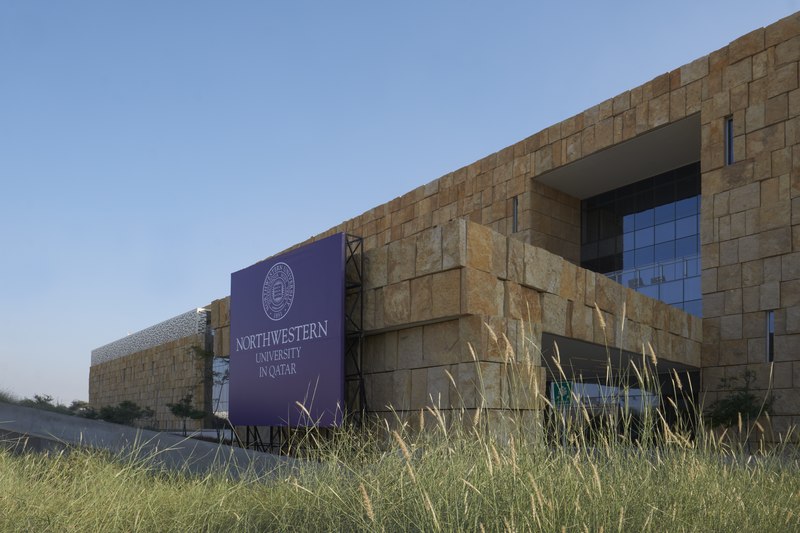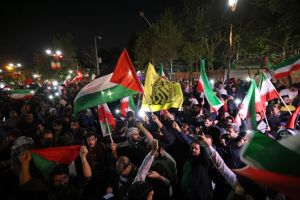“It is often said that history will judge us not only for what we said and did in times of strife, but also for our silence.” So wrote Northwestern University Medill School of Journalism dean Charles Whitaker in 2018.
The statement was released following a heated exchange between former president Donald Trump and CNN reporter Jim Acosta, which resulted in the White House revoking Acosta’s press pass. Whitaker believed it was important for an “institution as prominent as Medill” to defend the journalism profession against such an “attack.”
Four years later, Northwestern has failed to practice what it preaches: it fell silent when Qatari security officials threatened to smash a Danish journalist’s camera during a live TV report on the FIFA World Cup. Such censorship is more deserving of comment than the Acosta affair since Northwestern has a branch campus in Qatar that focuses on journalism education. Administrators might claim that Qatari officials issued an apology. But as Whitaker wrote after a federal judge temporarily restored Acosta’s press privileges, the incident “remains an affront” to “expressive freedoms.”
Northwestern’s silence speaks volumes about the university’s priorities. Yet this is hardly surprising given that American universities have been bought off by authoritarian countries that practice censorship. The Qatar Foundation has paid Northwestern more than $600 million to operate a branch campus in Doha. The relationship with Qatar has also resulted in several gifts to fund professorships on Northwestern’s home campus, including one for the journalism school.
For most, entering into a relationship with a well-known problematic actor would seem like a recipe for disaster. Former Northwestern faculty senate president Stephen Eisenman even advised in a 2015 report that the university should only continue work in Qatar if the country relaxes its speech and press restrictions, but university administrators didn’t listen. As the National Association of Scholars documented in its recent case study on Northwestern-Qatar, university administrators focused more on the opportunities than the moral complicity of working with Qatar.
Eisenman explained that, prior to his trip to the Qatar campus, Northwestern administrators believed they were “doing God’s work” and “felt no need to interfere with the Divine plan.” Former dean of Northwestern-Qatar Dennis Everett hoped the Arab Spring would result in more free expression rights in Qatar. Toward the end of his term, Everett said that one challenge for his successor was to transfer the “values and the programs of Northwestern in a very different cultural setting.”
Northwestern thought it could change Qatar. But Qatar has changed Northwestern.
This is evident from Northwestern’s coverage of FIFA, which repeatedly attacks the West. Northwestern held a sports journalism conference in October that aimed to “kick around” narratives and assumptions about soccer in Qatar. One of the speakers, Georgetown University-Qatar professor Abdullah Al-Arian, claimed, “The West’s coverage completely erases the football culture and history of the region through a series of assumptions that give Europe a certain ownership claim over football globally.” Al-Arian’s argument is clearly a straw man meant to delegitimize valid criticisms of Qatar’s hosting of the World Cup. In a recent New York Times piece on the subject, he claimed that those criticisms “seemed to be rooted in false cultural assumptions about Qatar,” but failed to provide a single example.
When university officials do admit to Qatar’s shortcomings, they can’t help but use the West as a scapegoat to explain the country’s mishaps. Craig LaMay, director of Northwestern-Qatar’s journalism program, admitted it was Qatar’s own fault that it had a poor international image. But then he hurried to attribute Qatar’s “draconian” media laws to Britain’s colonialist legacy. Except that Qatar has the power to eliminate a half-century-old media law just as it had the power to reverse its alcohol policies for the general public just days before kickoff.
Northwestern’s nonexistent response to recent Qatari censorship demonstrates why branch campuses in authoritarian nations are a bad idea. Northwestern has lent its credibility to the propaganda of an authoritarian and anti-Western regime, whitewashing its censorship and inevitably participating in self-censorship to maintain ties. There is no guarantee that Qatar will ever provide substantive press freedoms; it has proven expert at bait-and-switch maneuvers.
As long as the Medill School of Journalism continues to work with Qatar, its commitment to “fight for the freedom of the press” will remain hollow.
Neetu Arnold is a senior research associate at the National Association of Scholars. Follow her on Twitter @neetu_arnold


















